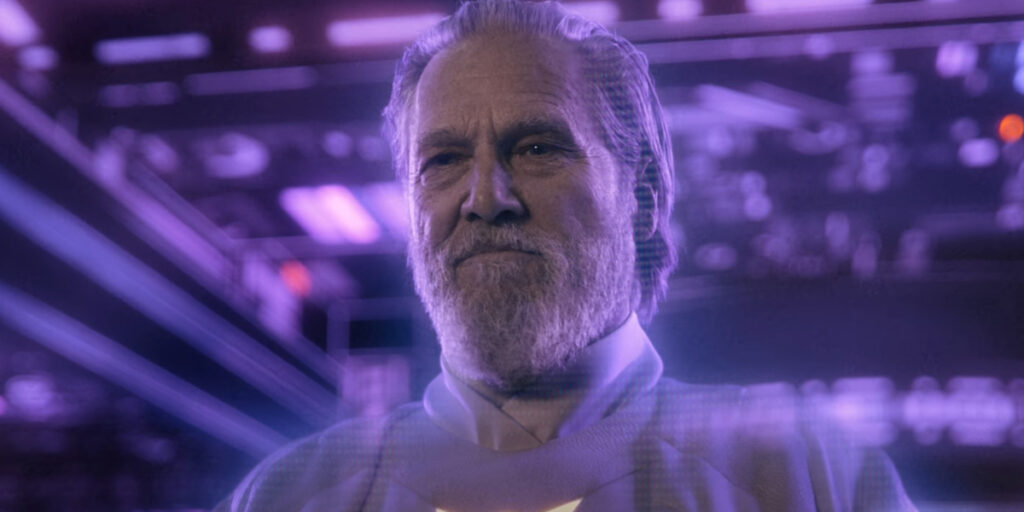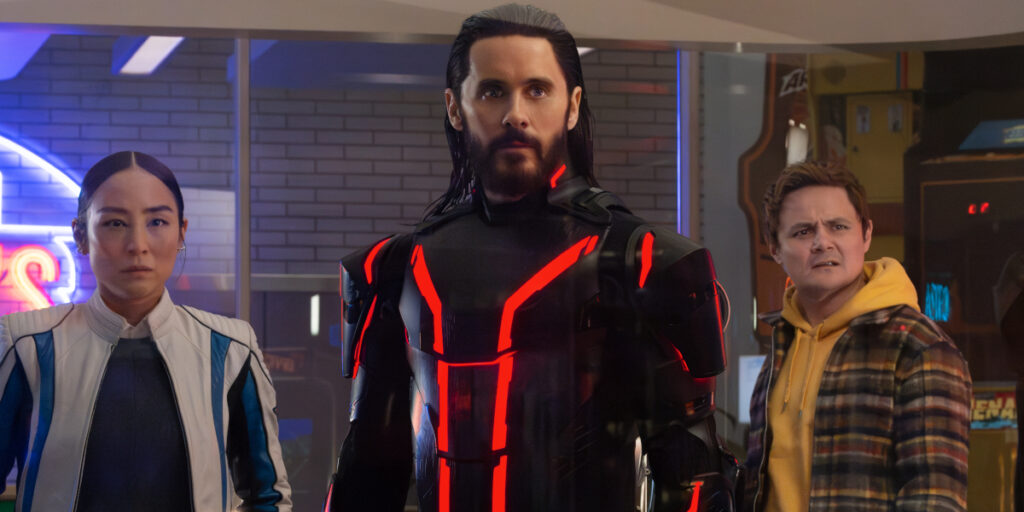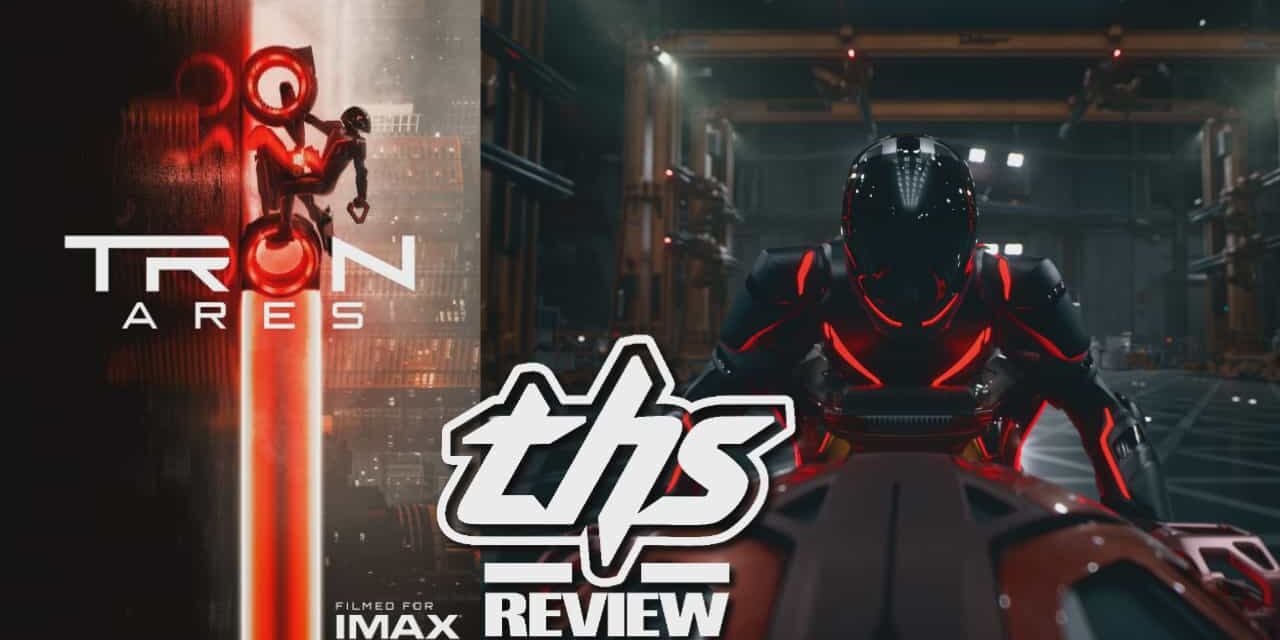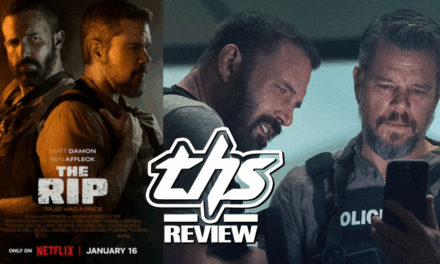The Grid: a digital frontier. Since 1982, Walt Disney Pictures has made select detours into the world of Tron, always bringing a new twist to the table when it’s time to play. Almost 15 years after its predecessor reintroduced the franchise to audiences at large, Tron: Ares has finally given the franchise the three-quel that fans have been asking for. Welcoming Users old and new, director Joachim Rønning (with a roster of diverse talent led by Jared Leto) lands an exciting new chapter in a world primed to (finally) erupt into chaos.
The common thread that has bound fans of Tron’s various eras has been why the characters from Legacy aren’t the main focus of Ares. Early on, it’s confirmed that yes, Sam Flynn’s adventure onto his father’s Grid happened, but the story plays the same card its predecessor did when continuing the story – it makes room for something new. This time, we’re introduced to an ENCOM run by CEO Eve Kim (Greta Lee), who has to compete with long-brewing baddies Dillinger Systems to find a crucial breakthrough between worlds – the Permanence Key.
Tron: Ares sticks the landing between past nods and present potential.
While I want a Tron: Legacy sequel as much as the next person, Rønning’s entry (from a script by writers David Digilio and Jesse Wigutow) does find a novel way to proceed that doesn’t leave anyone behind. The resurrection of the Dillinger family saga, through CEO Julian (Evan Peters) and his mother Elizabeth (Gillian Anderson), is where the meat of the past lies – save for, of course, Kevin Flynn (Jeff Bridges) returning in his own special way.
At this point in human history, the saga created by Steven Lisberger and Bonnie MacBird is more bleeding-edge than ahead of the curve, which could have been a massive obstacle. However, that description best sums up what’s on display this time out, as the fairly compact timeline of Ares (Jared Leto) and his visit to our realm ratchets up the tension of this story with a solid foundation.
The decision not to harp on past glory leaves Tron: Ares free to accomplish what it needs to do: bring a new set of eyes to the table. It’s not just a rematch between the Dillingers and the Flynns, but rather another opportunity to remind everyone why they were the most iconic villains in Tron’s world.

Though Ares can feel like it’s holding back at times, it’s actually an advantage.
Your standard Tron hallmarks are still present and accounted for in Ares: musings of how the Digital Frontier could help, or harm, humanity, cool-looking aesthetics, and breathtaking set pieces. I’m not downplaying those factors at all, as that glue properly holds together the unique round of ideas that this third trip into the computer provides. Instead, I’d suggest that Tron: Ares employs a tactic we definitely aren’t used to in this world: restraint.
Jared Leto’s central performance embodies that ethos rather smartly, as Ares’ fish-out-of-water journey isn’t as jokey or hokey as some were afraid of. (That “Burning Man” gag you saw in the commercials? It’s not in the movie.) As a Program trying to understand the human condition, while growing beyond his programming, Tron: Ares’ eponymous lead does get awkwardly human moments – like tangents about loving ‘80s synthpop.
Again, restraint is the key to what helps this movie work, but also what works against it in some minor pockets. Like any other oft-delayed legacy-quel, Tron 3 needs to remind you why this world is beloved, and what it stands for, after gathering dust for over a decade. The picture surely excels in that aspect, but you can feel the creatives holding back in some spots. If you’re someone who’s followed this series for some time, you might feel like Tron: Ares is a bit of a “101” course for the next generation of die-hards.
Personally, I’m not mad at Tron: Ares sacrificing deep lore development to maintain a central concept that plays to everyone. Looking back on various legacy-quels that overstuff their stories full of callbacks, references, and in-jokes, I’m glad to see that Ares‘ final form didn’t swap an actual story for nostalgia bait.

It better not take another 15 years to bring Tron back to the big screen.
Tron: Ares is just about to be unfurled upon the world, so there’s going to be plenty of time to dissect the whole smash a bit further. Purely on first blush, I must say I’m pleased with the results, as the world of Tron continues to delve into the moral issues surrounding A.I. and computing with enthusiasm. But as always, that philosophy is married to the visual adventure and thrills that have come to define this series since its inception in 1982.
Most legacy continuations of this sort tend to reward those deep in the lore, while also allowing for new additions to the throng – and that balance is something that can easily go wrong. By providing a compelling adventure that focuses on the here and now, the selective shades of the past allowed in Tron: Ares actually brought a smile to my face. The past means something in this cinematic universe, but it doesn’t rule everything.
Rest assured, everyone will be able to chew on some large questions left over when Tron: Ares reaches its final destination. I seriously hope that we’ll see the hypothetical next chapter in development sooner than later, because part of what this movie held back on feels like it’s teased in all of the sequel-friendly moments you’re about to see.
To get a fourth Tron movie that doesn’t need to rebuild the foundation would allow the series to confidently go hard on its bullish plans. That’s something these movies haven’t been allowed to do since the first picture’s release, and before this series hits End of Line, I think we’re owed at least one all-out installment to really tie The Grid together.
For more Reviews, make sure to check back to That Hashtag Show.


![Clint Eastwood’s Cry Macho Is As Predictable As The Sun Setting In The West [Movie Review]](http://18.211.146.234/wp-content/uploads/2021/09/cry-macho-cover-440x264.png)

![Carson MacCormac, Vincent Muller & Adam Cesare talk ‘Clown in a Cornfield’ [Interview]](http://18.211.146.234/wp-content/uploads/2025/05/project_20250506_0131379-01-440x264.png)
![That Christmas: Director Simon Otto On Bringing Richard Curtis’ Holiday Tale To Life [Interview]](http://18.211.146.234/wp-content/uploads/2024/12/project_20241206_1413018-01-440x264.png)